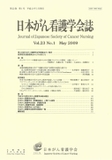Japanese
English
- 販売していません
- Abstract 文献概要
- 参考文献 Reference
- サイト内被引用 Cited by
要旨
本研究の目的は,病気になる以前から家族としての歴史を持った終末期がん患者と家族が,死別を意識し苦難が多くても在宅で過ごしながら時間と空間を共有する中で,家族として象徴的な意味づけや価値を持った行動を今の状況に調和させて日常的に行うことによって,相互の関係性を深めたりそれぞれのアイデンティティを確立するといった肯定的な感情や認知をもたらすプロセスであるEnrichmentとして明らかにすることにより,終末期の在宅療養を継続していくための新たな看護の示唆を得ることである.
訪問看護ステーションから紹介され研究参加に同意を得た家族介護者15名を対象に,半構成的面接によって得たデータを質的帰納的に分析した.
その結果,患者と家族の歴史や関係性を踏まえて行われる出来事(Enrichingevent)には,[これまでの日常的な交流から生まれる出来事][今までどおりできなくても二人で取り戻す出来事][終末期になって近づいた二人の出来事][一度きりでも大きな意味をもたらす出来事]の4つのカテゴリーが抽出され,これらの出来事には≪二人の日常に幸福感がもどる≫≪感動や喜びを分かちあう≫≪残された二人の時間を創りかえる≫≪互いの安心感を伝えあう≫≪相手が今は元気でいることを実感する≫≪一緒に生きてきたことを互いに認めあえる≫≪相手の人生に想いを馳せる≫≪二人の時間がよみがえる≫≪相手の自尊心や威厳を再認識する≫といった9つの意味づけが含まれていた.そしてこれらの出来事を繰り返し意図的に行うことで,家族介護者は【なじんできた生活を最期まで保つ】という介護の意味づけを見いだしたり,【二人の絆が強まる】【自分の気持ちを整える】【自分の存在意義を見いだす】といった成果がもたらされていることが明らかになった.
終末期がん患者との苦悩の多い日々を自宅で過ごす中で,家族介護者が短時間でも豊かな気持ちになることや,肯定的な認知が得られて自分の人生を認められるようになることは,予期的悲嘆や患者の死後の悲嘆の過程に向き合う力になると考えられ,日ごろのかかわりから患者と家族がこれまでの生活の中で大切にしてきたことや人生の意味づけを引き出す看護支援が必要であることが示唆された.
Abstract
The purpose of this study is to make clear the enrichment that family caregivers experience by sharing enriching events with terminally ill cancer patients at home, while gaining positive meaning and satisfaction through these events.
Enrichment has been defined by Archbold and Cartwright as the process of endowing caregiving with meaning or pleasure for both caregiver and care recipients. It enhances the positive qualities of the mutual relationship and is associated with reducing some dimensions of caregiver role strain.
Data was collected from 15 caregivers and 13 terminally ill cancer patients at home introduced by home care stations, and by semi.structured interviews in their homes or in a hospital. The data was analyzed qualitatively and inductively through three stages: antecedent factors, enriching events, and consequences.
The enriching events occur as a result of the long interpersonal history and relationship between patients and caregivers. The enriching events have 4 categories(events arising from continuation of customary routines, events where the routine is adapted, developing greater closeness in the terminal phase, and meaningful events even if only done once), and includes 9 reasons for significance attached(return to daily happiness, sharing pleasure and joy, making the most of remaining time together, mutual reassurance, confirming that the patient is in the best condition possible, mutual recognition of shared life, focusing on the patient's life, sharing memories of their life, reconfirm the dignity and self respect of the patient). Family caregivers gained meaning and identity from caregiving(maintaining their normal life, strengthened relationship, putting their emotions in order, and reaffirming reasons for being)through the enriching events.
These results suggested that family caregivers to terminally ill cancer patients can overcome grief through gaining positive thinking and emotional enrichment. This is why nursing support is necessary to promote value and meaning in the lives of the terminally ill.
Copyright © 2009, Japanese Society of Cancer Nursing All rights reserved.


